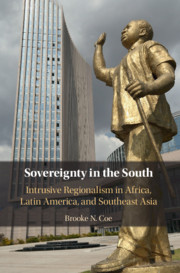Book contents
- Sovereignty in the South
- Sovereignty in the South
- Copyright page
- Contents
- Figures
- Tables
- Acknowledgments
- Acronyms
- Introduction
- 1 The Uneven Rise of Intrusive Regionalism
- 2 Macronationalism and the Discursive Foundations of Regionalism in the Global South
- 3 Contested Sovereignty Norms and the Erosion of Non-interference
- 4 The Role of Regime Type
- 5 The Role of Economic Performance
- Conclusion
- Bibliography
- Index
4 - The Role of Regime Type
Published online by Cambridge University Press: 19 October 2019
- Sovereignty in the South
- Sovereignty in the South
- Copyright page
- Contents
- Figures
- Tables
- Acknowledgments
- Acronyms
- Introduction
- 1 The Uneven Rise of Intrusive Regionalism
- 2 Macronationalism and the Discursive Foundations of Regionalism in the Global South
- 3 Contested Sovereignty Norms and the Erosion of Non-interference
- 4 The Role of Regime Type
- 5 The Role of Economic Performance
- Conclusion
- Bibliography
- Index
Summary
Because of variation in the discursive foundations of regionalism and in the degree and nature of norm contestation and erosion, Latin America, Africa, and Southeast Asia arrived at the end of the Cold War with different normative priors. These normative priors interacted with other key variables during the second wave of regionalism, one of which is regime type. Democratization in Latin America during the 1980s was extensive, and, by the end of this decade, the region boasted a high “density” of democracy. The achievement of this critical mass of democracies contributed to the renewal of the development of intrusive regionalism (especially aimed at democracy promotion) in the region. Neither Africa nor Southeast Asia has achieved this density. Although average democracy scores in these other regions have been on the rise in the last twenty years, they remain in the “anocracy” range. Even though high democratic density was not achieved in these two regions, though, individual states democratized, and emerging democracies with regional leadership aspirations, like South Africa and Indonesia, have been at the forefront of regional reform campaigns.
- Type
- Chapter
- Information
- Sovereignty in the SouthIntrusive Regionalism in Africa, Latin America, and Southeast Asia, pp. 120 - 142Publisher: Cambridge University PressPrint publication year: 2019



